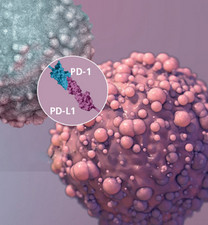No. 23: A finding that propelled new treatments for cancer

For more than a century, scientists were baffled by a mystery of the human immune system: Why did the body’s so-called killer T-cells – which seek and destroy virus-infected cells – give up their fight when facing cancer and chronic infections?
Emory immunologist Dr. Rafi Ahmed discovered the answer.
Ahmed found that when T-cells are exposed to chronic viral infections, they produce an “inhibitory receptor” called PD-1. When that receptor encounters a protein – with the similar name of PD-L1 – on infected cells, the T-cell attackers lay down their arms and stop fighting the disease.
This finding opened the door to an important discovery about cancer cells, some of which use the same tactic of cloaking themselves with the PD-L1 protein to put the brakes on killer T-cells.
So Ahmed and his team suggested a solution: a PD-1 inhibitor that blocks the connection between PD-1 and PD-L1. They found that the blocked connection removed the brakes on the T-cells, allowing them to get back to work — essentially empowering the patient’s own immune system to fight cancer.
Ahmed’s discovery was key to accelerating the development of a new class of cancer immunotherapy drugs that are now saving lives. Three of these drugs — Nivolumab (Opdivo®), Pembrolizumab (Keytruda®) and Atezolizumab (Tecentriq®) — have been approved to treat melanoma, lung cancer and bladder cancer. And many more therapies using PD-1 inhibitors are now being tested in clinical trials to treat a variety of cancers.
If Keytruda® sounds familiar, that’s because it made news in 2016 as the drug Jimmy Carter credits with helping him fight metastatic melanoma.
Cancer is a complex disease. But with breakthroughs in fundamental research such as Ahmed’s, scientists are creating more targeted treatments and saving more lives.
